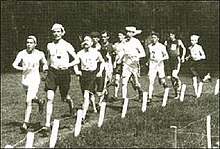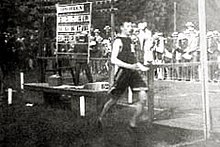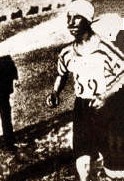1900 Summer Olympics / Athletics - Marathon (Men)

|
|
| sport | athletics |
| discipline | Marathon run |
| gender | Men |
| place | Croix Catelan |
| Attendees | 13 athletes from 6 countries |
| Competition phase | July 19, 1900 |
| Medalist | |
|---|---|
|
|
Michel Théato ( FRA / LUX )
|
|
|
Émile Champion ( FRA )
|
|
|
Ernst Fast ( SWE )
|
The international competitions for physical exercise and sport (Concours Internationaux d'Exercices Physiques et de Sports) held in the French capital Paris as part of the Paris World Exhibition in 1900 ( Exposition Universelle et Internationale de Paris ) also included a marathon . The International Olympic Committee (IOC) assigned this competition to the program of the 1900 Olympic Games (Games of the II Olympiad). The event took place on July 19, 1900.
Olympic champion was Michel Théato , who was wrongly assigned French citizenship, but he was a Luxembourger. The Frenchman Émile Champion was second ahead of the Swede Ernst Fast .
prehistory
The marathon was and is a part of the athletic competitions. This competition always receives special attention at the Olympic Games , because it is surrounded by the mythical flair of ancient Greece. Even the marathon run during the first Olympic Games in Athens at a historic location thrilled an enormous crowd. According to the organizers in Paris, this should be repeated. However, the run advertised on the occasion of the world exhibition was under an extremely unfavorable star.
Long distance running was not uncommon at the time. A scene of professional runners had already formed, dipping from place to place and vying for the cash prizes. In many cases, it was a question of runs in a stadium that lasted several hours. There was also about a 6-hour run during the world exhibition that was not considered Olympic by the IOC .
On July 8th, eleven days before the Olympic marathon, the long-distance race over 40 km from Conflans to Paris , which had been held since 1896, took place in which 132 professional runners took part. Sports officials, runners and spectators now asked themselves why a short time later a run of the same length was held with next to nothing to win? The press judged accordingly negative and gave the race the name Marathon des Fortifs (fortress marathon), under which this run went down in history. So it was not surprising that only 16 runners started the competition. Nevertheless, a certain prestige should not be denied, because seven nations were represented among the runners.
The second unfortunate circumstance was the temperature on the day of the competition, July 19th. Depending on the section of the route, 35 to 39 degrees were measured. The route was a circular course along the old outer fortifications (the fortifications ) clockwise around the city center of Paris, where the inner ring road runs today (Boulevard Périphérique). This 40.26 km long route was another reason for displeasure and many disputes.
Race course
July 19, 1900, 2:36 pm
The start took place on the grounds of the Racing Club de France the Croix Catelan , which was also the venue for all other athletic competitions. At the beginning, the grass track was lapped four times before heading out into town. The marshals, most of whom had been recruited a few days earlier through an advertisement in a newspaper, seemed overwhelmed. Not only were they unable to protect the runners from the tangle of carriages, bicycles and a huge retinue of curious followers, they were also apparently insufficiently informed about the route through the winding streets and led some runners to detour. There were no markings anyway.
The French runners led from the start, only the Swede Ernst Fast could keep up. The French, who knew the area and were well informed about the route, especially one of the favorites, Georges Touquet-Daunis , made their own way through the chaos. After almost half the distance, an anecdote revolves around the leader, according to which he hastily had a beer in a bistro near the Porte de Clignancourt and had to give up shortly afterwards with stomach problems.
The 19-year-old Swede Fast now took the lead, but he was unable to maintain himself at the top for a long time. Another favorite, Émile Champion , and an unknown runner named Michel Théato passed Fast. Champion was supported by a pacemaker , the professional runner Ducro. This fact, too, is a nuisance, especially for the foreign runners, and an example of the haphazard organization. In the final kilometers, Théato clearly set himself apart from Champion and won with a time of just under 3 hours. Champion only followed 5 minutes later. Fast, who finished third, was already more than half an hour behind. Only 7 runners reached the finish, the others had to pay tribute to the unspeakable conditions.
There were numerous protests after the event. Ernst Fast complained that he was allegedly deliberately misdirected by a police officer and that he was only sent back on the right path by astonished passers-by, but had to accept an unreachable backlog. The fifth, the American Arthur Newton , claimed for years that the French runners had shortened because of their knowledge of the route, because after all, he had taken the lead halfway through the race and would not have been overtaken by anyone afterwards. Dick Grant , Newton's compatriot, even sued the organizers and led an inconclusive process that lasted for years.
The Olympic marathon in Paris has a flaw to this day. This is reinforced by the IOC by the fact that the winner, Michel Théato, is still incorrectly listed as a Frenchman in the winners' lists . In the meantime, by finding his birth certificate, it has been established that Théato was born in Luxembourg . Théato lived in Paris, but he was definitely too young to take French citizenship. As a member of the Club amical et sportif de Saint-Mandé , his club and all of France boasted after his victory, so that his origins were no longer traced. The IOC has not yet taken this knowledge into account in its published lists of winners and in the medal table.
It is also impossible to get rid of a rumor that Théato was a baker's boy who got his stamina when delivering the rolls and who got through the heat during the marathon because he was used to it from the bakery. His victory was surprising and inexplicable for many observers, understandably this simple reason was used. In fact, Théato was a cabinet maker.
Dick Grant's citizenship is also incorrectly stated. Like his brother Alex Grant , who took part in the 800-meter run, he was a Canadian citizen. Because they studied in the USA and Alex started for the New York Athletic Club and the University of Pennsylvania, Dick Grant for Harvard University , they were listed as Americans.
Results
| space | athlete | country | Time (h) |
|---|---|---|---|
| 1 | Michel Théato | FRA / LUX | 2:59:45 |
| 2 | Émile Champion | FRA | 3:04:17 |
| 3 | Ernst Fast | SWE | 3:37:14 |
| 4th | Eugène Besse | FRA | 4:00:43 |
| 5 | Arthur Newton | United States | 4:04:12 |
| 6th | Dick Grant | USA / CAN | k. A. |
| 7th | Ronald MacDonald | CAN | |
| - | Georges Tourquet-Daunis | FRA | DNF |
| Auguste Marchais | FRA | ||
| William Saward | GBR | ||
| Ion pool | GBR | ||
| Frederick Randall | GBR | ||
| Johan Nyström | SWE |
The many legends surrounding Théato do not stop at the photographs either. The most common photo shows a runner in a striped jersey with the number 62 being sprayed with water by a marshal. For a long time it was supposedly the only known photo of the Olympic marathon, so it was assumed that it was the winner. In fact, the photo was taken at the professional runners' race eleven days earlier. So this is not about Théato.
literature
- Volker Kluge : Summer Olympic Games. The Chronicle I. Athens 1896 - Berlin 1936. Sportverlag Berlin, Berlin 1997, ISBN 3-328-00715-6 .
- Karl Lennartz , Walter Teutenberg: II. Olympic Games 1900 in Paris. Presentation and sources. AGON Sportverlag, Kassel 1995, ISBN 3-928562-20-7 .
- Bill Mallon : The 1900 Olympic Games. McFarland & Company, Inc., Jefferson, North Carolina 1998, CIP 97-36094.
- Walter Mallmann: Olympic marathon. Sport und Medien Verlag 1993, ISBN 3-9803182-4-9 .
- Ekkehard zur Megede , The history of Olympic athletics, Volume 1: 1896–1936, Verlag Bartels & Wernitz KG, Berlin, 2nd edition 1970
Web links
- Side of the IOC for the Olympic Games in 1900 (English)
- Official report (French, PDF, 3 parts in total; 8.10 MB)
- Page about all Olympic participants by Herman de Wael (English)
- SportsReference, Athletics at the 1900 Paris Summer Games: Men's Marathon , accessed July 19, 2018
Footnotes
- ↑ Kevin B. Wamsley, American Boys in Paris: Canadian Participation in the Games of 1900. Fourth International Symposium for Olympic Research ( online version from the LA84 Foundation ; PDF; 34 kB)



